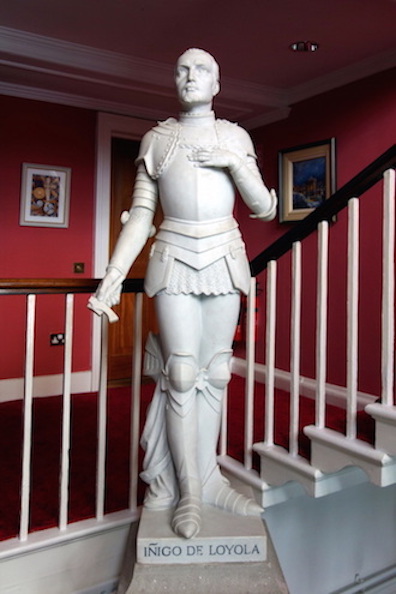Ulysses contains many references to the "jesuits," a
large order of Catholic priests and brothers known formally as
the Society of Jesus, or S.J. The order was founded in the
16th century by Iñigo López de Oñaz y Loyola (1491-1566), a
Spanish knight from a noble Basque family called by the Latin
name Ignatius Loyola.
Stephen Dedalus, like Joyce, has received a good education
from the Jesuits during most of his years from age 6 onward,
and an official in two of the schools he attended, "John Conmee S.J.," appears under
his own name in Wandering Rocks. In the opening
sentences of Telemachus Buck Mulligan insultingly
calls Stephen a jesuit despite his apostasy. Joyce did not
disagree.
The S.J. enjoys a reputation of being the most intellectually
rigorous of the Catholic holy orders, a reputation based on
its members’ work in education and intellectual research. The
Jesuits operate seminaries, universities, secondary schools,
and elementary schools in many countries around the world,
including Ireland. They taught James Joyce at Clongowes Wood College in
County Kildare from 1888 to 1891 (ages 6-9), at Belvedere
College in Dublin from 1893 to 1898 (ages 11-16), and at
University College in Dublin from 1898 to 1902 (ages 16-20).
Joyce attended Belvedere on scholarship; the family fortunes
had declined and this preparatory school, like many Jesuit
institutions, underwrites the education of students who cannot
afford to pay.
A Portrait of the Artist represents Joyce’s
experiences at both schools, including his stellar academic
success at Belvedere where he won many honors and prizes. When
the Jesuits invite Stephen Dedalus to consider that he may
have a calling to become one of them, he declines, and walks
away not only from the priesthood but also from the Catholic
Church. But even in the first flush of apostasy, in part 5,
Stephen finds inspiration for his aesthetic theories in the
philosophy of Thomas Aquinas, and when Cranly
asks him if he intends to become a Protestant he says, "What
kind of liberation would that be to forsaske an absurdity
which is logical and coherent and to embrace one which is
illogical and incoherent?" His love of Jesuit intellectual
rigor continues in Ulysses. In Scylla and
Charybdis, as he tries to set the scene in
Shakespeare's London, Stephen thinks of the founder's
influential instructions for religious meditation, which begin
with a vividly sensory "composition
of place" and then analyze the images for significance:
"Composition of place. Ignatius Loyola, make haste to
help me!"
Later in the same chapter, Stephen thinks of the role that
another Jesuit played in the Gunpowder Plot to blow up the
English Parliament and King in 1606: "Warwickshire
jesuits are tried and we have a porter's theory of
equivocation." Gifford observes of "the
Warwickshire Jesuit Henry Garnet, provincial
of the then-underground order in England," that he
"distinguished himself at trial by defending the 'doctrine of
equivocation,' that is, maintaining that his attempt to
practice deliberate deception on his accusers (i.e., to lie
under oath) was perfectly ethical if done 'for the greater
Glory of God' (Jesuit motto)." Shakespeare responded to this
ingenious Jesuit reasoning by having the Porter in Macbeth
joke about an "equivocator" trying unsuccessfully to reason
his way into heaven.
In Telemachus, Mulligan calls Stephen "you
fearful jesuit," suggesting that he has
internalized the rigorous intellectual severity of the order,
and also perhaps that in his sternly meditative way he is
afraid of life. Later in the chapter, fending off Stephen's
anger at his having made light of his mother's death, Mulligan
explains Stephen's refusal to pray at his mother's bedside by
saying, "you have the cursed jesuit strain in you,
only it's injected the wrong way." Even in his
rejection of Christianity, Mulligan seems to be saying,
Stephen acts with an uncompromising and unworldly insistence
on intellectual consistency that he learned from the Jesuits.
"Look at the sea. What does it care about offences? Chuck
Loyola, Kinch, and come on down." In Oxen of
the Sun, Mulligan is still lambasting Stephen as a "Jesified,
orchidised, polycimical jesuit!" His attacks imply
that Stephen has much further to go in ridding his mind of his
religious instruction, and that he must do so if he wants to
succeed as an artist.
Joyce agreed only in part. He renounced the church but not
his Jesuit education. Much later in life, he remarked to his
friend Frank Budgen in Zurich, "You allude to me as a
Catholic. For the sake of precision and to get the correct
contour on me, you ought to allude to me as a Jesuit." Edna
O'Brien remarks, "The Jesuits he called in his adult life a
'heartless order that bears the name of Jesus by antiphrasis'.
Yet his indoctrination from them he thought invaluable" (5).

